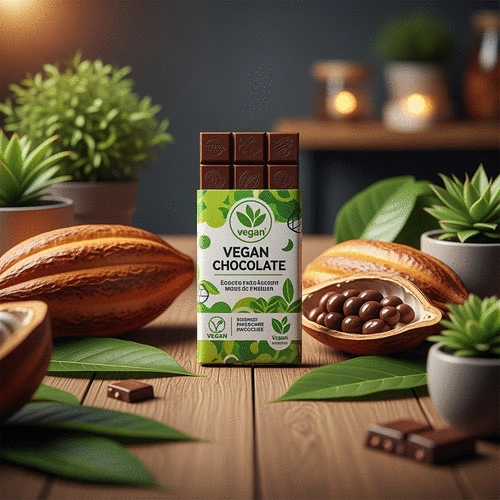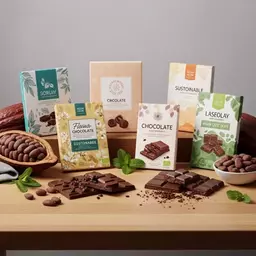Did you know that choosing vegan chocolate can significantly reduce your carbon footprint and promote ethical practices? The chocolate industry is evolving, and your choices can play a part in this transformation. Let's explore what you can gain by embracing sustainable chocolate!
What You Will Learn
- Vegan chocolate is free from dairy and animal-derived ingredients, making it a more sustainable choice.
- Opting for vegan options helps reduce deforestation and carbon emissions linked to traditional chocolate production.
- Your chocolate choices can promote biodiversity and support ethical sourcing practices, contributing to a healthier planet.
- You can make informed choices by checking for certifications like Fair Trade and Organic when purchasing vegan chocolate.
- Engaging in local sustainability initiatives and spreading awareness can enhance the positive impact of your chocolate consumption.
The Vegan Chocolate Advantage: Environmental Impact Comparison
Delve into the key environmental benefits of choosing vegan chocolate, focusing on reduced carbon footprint, water conservation, land use, and ethical sourcing.
Reduced Carbon Footprint
Vegan chocolate production typically generates fewer greenhouse gas emissions compared to traditional dairy chocolate.
Water Conservation
Plant-based ingredients require significantly less water, crucial in areas facing drought.
Better Land Use
Cacao farming for vegan chocolate supports regenerative agriculture that enhances soil health.
Ethical Sourcing
Often aligns with brands that prioritize fair trade and sustainable practices.
Understanding the Impact of Vegan Chocolate on Environmental Sustainability
As a passionate vegan chocolate enthusiast, I often reflect on how our indulgences can align with our values. Vegan chocolate is not just a delicious treat; it embodies a commitment to sustainability and ethical choices. But what exactly is vegan chocolate, and why does it matter? Let’s explore these questions and uncover the importance of this delightful alternative.
What Is Vegan Chocolate and Why Does It Matter?
At its core, vegan chocolate is made without any animal products, relying instead on plant-based ingredients to deliver rich flavors and textures. It matters because it challenges the traditional chocolate industry, which has significant environmental impacts due to dairy and unsustainable farming practices. By choosing vegan options, we’re not only treating ourselves but also making a statement for the planet!
- Free from dairy and animal-derived ingredients
- Focuses on ethical sourcing and sustainability
- Encourages healthier indulgence without guilt
Embracing vegan chocolate means supporting a sustainable lifestyle that aligns with our values of compassion and responsibility. Plus, it opens up a world of flavors and possibilities that can inspire our culinary adventures!
The Significance of Sustainability in the Chocolate Industry
The chocolate industry, while beloved, carries a heavy burden on the environment. From deforestation for cacao farming to the carbon emissions from dairy production, the traditional chocolate supply chain is fraught with sustainability issues. For instance, a study published in Nature Food highlighted that plant-based food products generally have lower environmental impacts, including greenhouse gas emissions, land use, and water use, compared to animal-based products. By opting for vegan chocolate, we contribute to a shift towards a more responsible industry that prioritizes the well-being of our planet.
- Reducing deforestation through plant-based sourcing
- Minimizing carbon emissions by eliminating dairy
- Promoting biodiversity in agricultural practices
It’s vital to recognize that our choices as consumers hold immense power. Every bar of vegan chocolate we enjoy is a step towards fostering a chocolate industry that respects the environment and values ethical practices. Together, we can make an impact that resonates well beyond our taste buds!
Environmental Benefits of Vegan Chocolate
Transitioning to vegan chocolate isn't just a trend; it's a crucial step towards a healthier planet. Let's dive into the many environmental benefits that come with choosing vegan over conventional chocolate. From lowering our carbon footprint to conserving precious water resources, the advantages are compelling!
Pro Tip
When selecting vegan chocolate, consider looking for brands that carry Fair Trade certifications. This not only ensures ethical sourcing but also supports sustainable farming practices that benefit both the environment and the farmers. Your choice matters—make it count!
Recapping the Environmental Impact and Consumer Role in Sustainability
As we dive deeper into the world of vegan chocolate, it's clear that our choices are more than just about taste; they have a significant impact on the environment. When we choose vegan chocolate, we are not just indulging in a delightful treat, but also consciously supporting a more sustainable planet. Every bite counts when it comes to fostering a healthier Earth!
By understanding the implications of our chocolate choices, we can contribute to a movement that prioritizes ethical indulgence and environmental stewardship. So, why does your choice of chocolate matter? Let’s explore!
Why Your Choice of Chocolate Matters for the Planet
Vegan chocolate isn't just a delicious alternative; it embodies a commitment to sustainability and ethical practices. Here’s why your choice matters:
- Reduced Carbon Footprint: Vegan chocolate production typically generates fewer greenhouse gas emissions compared to traditional dairy chocolate. This is a significant factor in combating climate change, as highlighted by various environmental studies.
- Water Conservation: Plant-based ingredients require significantly less water, which is crucial in areas facing drought. The FAO (Food and Agriculture Organization) provides extensive data on crop water requirements, illustrating the efficiency of plant-based agriculture.
- Better Land Use: Cacao farming for vegan chocolate supports regenerative agriculture that enhances soil health. Sustainable cultivation practices are vital for maintaining biodiversity and preventing land degradation, which is a key focus for organizations like the IUCN (International Union for Conservation of Nature) in their work on cocoa and climate change.
- Ethical Sourcing: Choosing vegan chocolate often aligns with brands that prioritize fair trade and sustainable practices.
By opting for vegan chocolate, you're making a choice that benefits not only your taste buds but also the environment. Every small decision contributes to a larger movement towards sustainability!
How to Make Informed Choices About Vegan Chocolate
Making informed decisions about vegan chocolate is easier than you might think! Here’s a quick guide to help you navigate your options:
- Read Labels: Look for certifications like Fair Trade or Organic to ensure ethical sourcing.
- Research Brands: Discover brands that align with your values. Visit their websites to learn about their sustainability practices.
- Support Local: Choose local producers when possible to reduce transportation emissions and support your community.
- Experiment: Try different varieties of vegan chocolate to find what you enjoy, and look for unique flavors that excite your palate!
Remember, the more informed you are, the better choices you can make. Your choices not only affect your enjoyment but also shape the future of sustainable chocolate production!
Frequently Asked Questions About Vegan Chocolate and Sustainability
Here are some common questions about vegan chocolate and its environmental impact:
- Q: What makes vegan chocolate more sustainable than traditional chocolate?
- A: Vegan chocolate is more sustainable primarily because it eliminates dairy and other animal products, which significantly reduces greenhouse gas emissions, water consumption, and land use associated with animal agriculture. It also often aligns with ethical sourcing and regenerative farming practices.
- Q: Are all vegan chocolates sustainably sourced?
- A: While vegan chocolate inherently has a lower environmental footprint due to being plant-based, not all brands are equally committed to sustainable sourcing. It's important to look for certifications like Fair Trade, Organic, and Rainforest Alliance to ensure the chocolate is ethically and sustainably produced.
- Q: How does vegan chocolate contribute to reducing deforestation?
- A: Traditional chocolate production often drives deforestation for cacao farming and livestock grazing (for dairy). By choosing vegan chocolate from brands committed to sustainable practices, you support cacao farming methods that preserve existing forests and promote biodiversity, rather than clearing land.
- Q: What certifications should I look for when buying sustainable vegan chocolate?
- A: Key certifications include Fair Trade Certified (ensures fair wages and working conditions), Certified Organic (no synthetic pesticides/fertilizers), Non-GMO Project Verified (no genetically modified organisms), and Rainforest Alliance Certified (focuses on biodiversity and sustainable farming).
- Q: Can my choice of chocolate really make a difference for the planet?
- A: Absolutely! Every consumer choice contributes to market demand. By consistently choosing sustainable vegan chocolate, you signal to the industry that there's a strong preference for ethical and environmentally friendly products, encouraging more brands to adopt these practices.
Join the Movement Towards Sustainable Chocolate Consumption
Now that we've explored the impact of our chocolate choices, it's time to take action! Joining the movement towards sustainable chocolate consumption is not just rewarding; it’s essential for a healthier planet. Together, we can make a difference!
Let’s look at how you can contribute to this exciting journey!
Encouraging Responsible Consumption: What You Can Do
Here are a few simple yet impactful actions you can take to promote responsible chocolate consumption:
- Choose Vegan: Make a conscious effort to select vegan chocolate options.
- Spread the Word: Share your knowledge about vegan chocolate and its environmental benefits with friends and family!
- Support Local Initiatives: Participate in local events focused on sustainability and ethical consumption.
- Commit to Learning: Stay curious about vegan chocolate and sustainability; the more you know, the more you can advocate!
Stay Informed and Advocate for Sustainable Practices
Being an informed consumer means continuously updating your knowledge. Follow blogs, social media accounts, and newsletters dedicated to vegan chocolate and sustainability, like the Vegan Chocolate Guide. Here are ways to stay engaged:
- Join Online Communities: Participate in forums or social media groups that discuss vegan products.
- Attend Workshops: Look for workshops on sustainable eating or making vegan chocolate.
- Engage with Brands: Reach out to chocolate brands to ask about their practices—transparency is key!
Supporting Eco-Conscious Products: A Guide to Vegan Certifications
When choosing vegan chocolate, recognizing certifications can guide you in selecting products that are both delicious and sustainable. Here’s a handy list of certifications to look out for:
- Fair Trade Certified: Ensures fair wages and working conditions for farmers.
- Certified Organic: Indicates no synthetic pesticides or fertilizers were used.
- Non-GMO Project Verified: Guarantees that the product is made without genetically modified organisms.
- Rainforest Alliance Certified: Focuses on biodiversity conservation and sustainable farming.
By choosing products with these certifications, you can savor your chocolate while supporting practices that protect our planet. What’s not to love about that?
Recap of Key Points
Here is a quick recap of the important points discussed in the article:
- Vegan Chocolate Benefits: Made without animal products, supporting ethical sourcing and sustainability.
- Environmental Impact: Choosing vegan chocolate reduces deforestation, carbon emissions, and promotes biodiversity.
- Informed Choices: Read labels and support brands that prioritize Fair Trade and organic certifications.
- Community Engagement: Share knowledge and support local initiatives to foster responsible consumption.
- Continuous Learning: Stay engaged with vegan chocolate trends and brands to advocate for sustainable practices.








